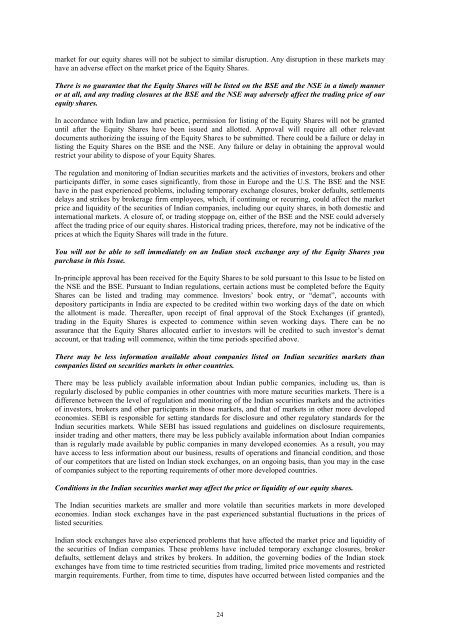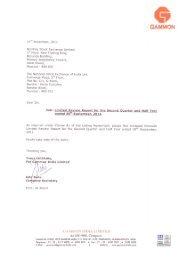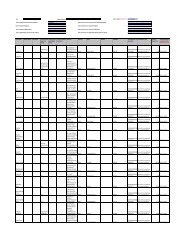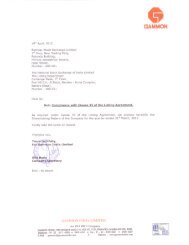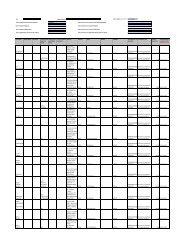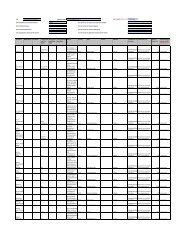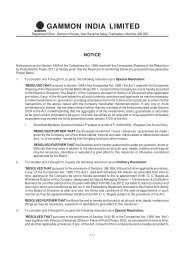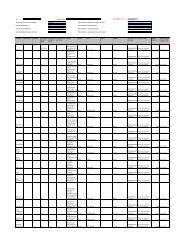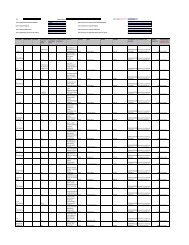GAMMON INDIA LIMITED
GAMMON INDIA LIMITED
GAMMON INDIA LIMITED
You also want an ePaper? Increase the reach of your titles
YUMPU automatically turns print PDFs into web optimized ePapers that Google loves.
market for our equity shares will not be subject to similar disruption. Any disruption in these markets may<br />
have an adverse effect on the market price of the Equity Shares.<br />
There is no guarantee that the Equity Shares will be listed on the BSE and the NSE in a timely manner<br />
or at all, and any trading closures at the BSE and the NSE may adversely affect the trading price of our<br />
equity shares.<br />
In accordance with Indian law and practice, permission for listing of the Equity Shares will not be granted<br />
until after the Equity Shares have been issued and allotted. Approval will require all other relevant<br />
documents authorizing the issuing of the Equity Shares to be submitted. There could be a failure or delay in<br />
listing the Equity Shares on the BSE and the NSE. Any failure or delay in obtaining the approval would<br />
restrict your ability to dispose of your Equity Shares.<br />
The regulation and monitoring of Indian securities markets and the activities of investors, brokers and other<br />
participants differ, in some cases significantly, from those in Europe and the U.S. The BSE and the NSE<br />
have in the past experienced problems, including temporary exchange closures, broker defaults, settlements<br />
delays and strikes by brokerage firm employees, which, if continuing or recurring, could affect the market<br />
price and liquidity of the securities of Indian companies, including our equity shares, in both domestic and<br />
international markets. A closure of, or trading stoppage on, either of the BSE and the NSE could adversely<br />
affect the trading price of our equity shares. Historical trading prices, therefore, may not be indicative of the<br />
prices at which the Equity Shares will trade in the future.<br />
You will not be able to sell immediately on an Indian stock exchange any of the Equity Shares you<br />
purchase in this Issue.<br />
In-principle approval has been received for the Equity Shares to be sold pursuant to this Issue to be listed on<br />
the NSE and the BSE. Pursuant to Indian regulations, certain actions must be completed before the Equity<br />
Shares can be listed and trading may commence. Investors‘ book entry, or ―demat‖, accounts with<br />
depository participants in India are expected to be credited within two working days of the date on which<br />
the allotment is made. Thereafter, upon receipt of final approval of the Stock Exchanges (if granted),<br />
trading in the Equity Shares is expected to commence within seven working days. There can be no<br />
assurance that the Equity Shares allocated earlier to investors will be credited to such investor‘s demat<br />
account, or that trading will commence, within the time periods specified above.<br />
There may be less information available about companies listed on Indian securities markets than<br />
companies listed on securities markets in other countries.<br />
There may be less publicly available information about Indian public companies, including us, than is<br />
regularly disclosed by public companies in other countries with more mature securities markets. There is a<br />
difference between the level of regulation and monitoring of the Indian securities markets and the activities<br />
of investors, brokers and other participants in those markets, and that of markets in other more developed<br />
economies. SEBI is responsible for setting standards for disclosure and other regulatory standards for the<br />
Indian securities markets. While SEBI has issued regulations and guidelines on disclosure requirements,<br />
insider trading and other matters, there may be less publicly available information about Indian companies<br />
than is regularly made available by public companies in many developed economies. As a result, you may<br />
have access to less information about our business, results of operations and financial condition, and those<br />
of our competitors that are listed on Indian stock exchanges, on an ongoing basis, than you may in the case<br />
of companies subject to the reporting requirements of other more developed countries.<br />
Conditions in the Indian securities market may affect the price or liquidity of our equity shares.<br />
The Indian securities markets are smaller and more volatile than securities markets in more developed<br />
economies. Indian stock exchanges have in the past experienced substantial fluctuations in the prices of<br />
listed securities.<br />
Indian stock exchanges have also experienced problems that have affected the market price and liquidity of<br />
the securities of Indian companies. These problems have included temporary exchange closures, broker<br />
defaults, settlement delays and strikes by brokers. In addition, the governing bodies of the Indian stock<br />
exchanges have from time to time restricted securities from trading, limited price movements and restricted<br />
margin requirements. Further, from time to time, disputes have occurred between listed companies and the<br />
24


